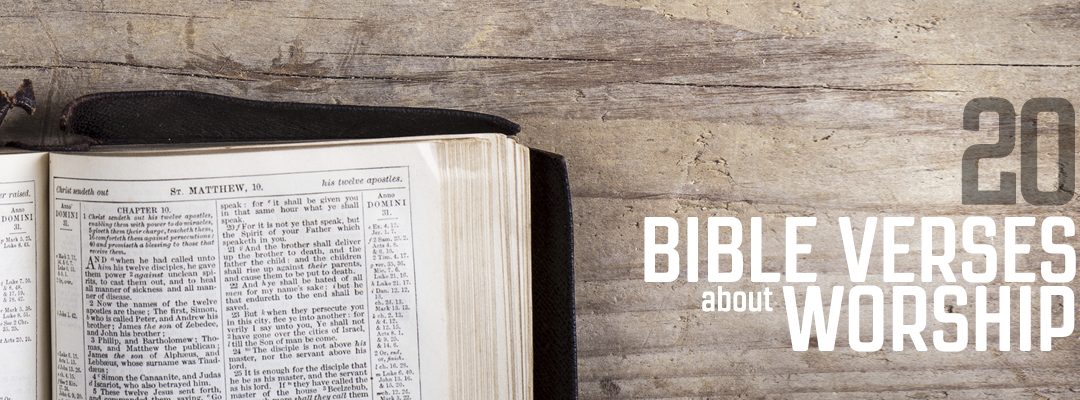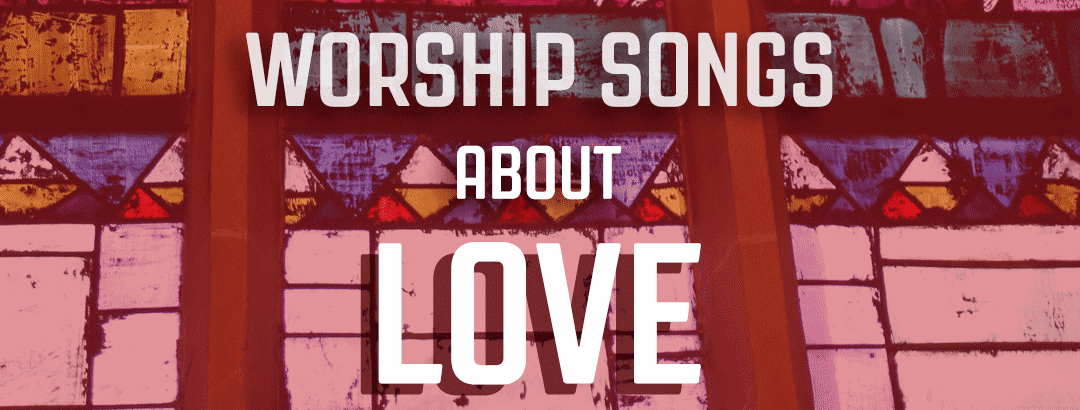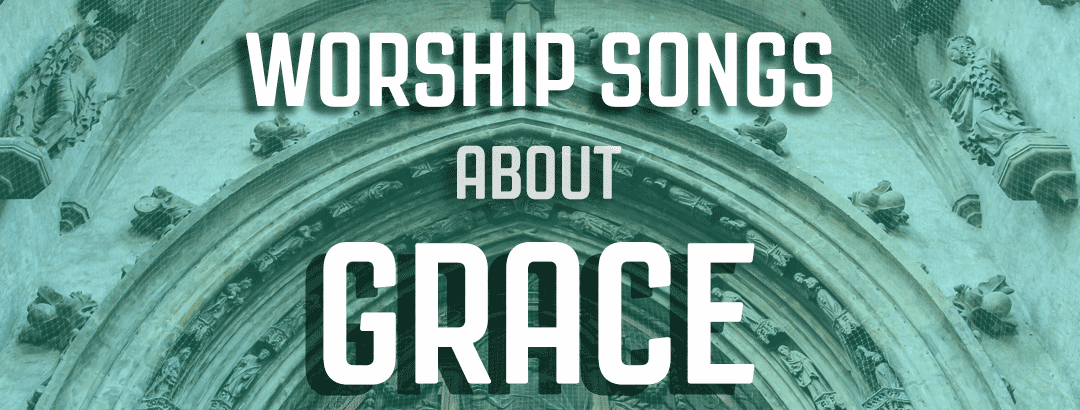Whether you’re a worship leader looking for some inspiration, a Bible study leader doing some research, or a pastor working on a sermon series on worship, we’ve got you covered! Here are 21 praise and worship scriptures to help you wrap your mind around how the Bible describes worship.

1. Worship linked to daily obedience (Ex. 23:25–26)
“You shall serve the Lord your God, and he will bless your bread and your water, and I will take sickness away from among you. None shall miscarry or be barren in your land; I will fulfill the number of your days.”
In the 20th chapter of Exodus, God spells out the ten commandments. For the next three chapters, Moses describes in detail the behavior that God expects from the nation of Israel. This includes instruction about things like:
- How altars are to be constructed and treated
- How servants are to be treated
- How personal injuries are to be addressed
- How to protect personal property
- How to treat your neighbors
- How the Sabbath law is to be applied and obeyed
- How God is to be celebrated
In context, Moses ties worship to daily obedience—and links the quality (and quantity) of life to God’s response.

2. Hannah’s worshipful prayer (1 Samuel 2:2)
“There is none holy like the Lord: for there is none besides you; there is no rock like our God.”
Hannah was the first wife of Elkanah. She couldn’t conceive a child and endured that heartbreak compounded by the regular taunting of her husband’s (fertile) second wife.
Once the priest Eli overheard her praying and weeping bitterly to the Lord. Eli assured her that God would give her the desires of her heart, and, in time, Hannah conceived a son who would become the prophet, Samuel. The second chapter of 1 Samuel opens with her prayer of thanksgiving and dedication.
3. David’s grateful worship (2 Samuel 7:21–22)
“Because of your promise, and according to your own heart, you have brought about all this greatness, to make your servant know it. Therefore you are great, O Lord God. For there is none like you, and there is no God besides you, according to all that we have heard with our ears.”
It’s not just in the Psalms that you get a peek at David’s worshipful spirit. Throughout the Samuels and Chronicles, you see David worshipping God. It just naturally bubbles up, which is why, despite David’s serious sins, the Lord our maker would call him a man after his own heart.
David is constantly claiming that the “Lord is my strength”! It seems that David sings the Lord a new song through every high and every low point in his life.
4. David’s song of thankful worship (1 Chronicles 16:31–34)
“Let the heavens be glad, and let the earth rejoice, and let them say among the nations, “The Lord reigns!” Let the sea roar, and all that fills it; let the field exult, and everything in it! Then shall the trees of the forest sing for joy before the Lord, for he comes to judge the earth. Oh give thanks to the Lord, for he is good; for his steadfast love endures forever!”
In the middle of 1 Chronicles is a beautiful Psalm of thanksgiving written by David. He is so overjoyed that the Ark of the Covenant is back in Jerusalem that he composes this song of worship and sings to the Lord. Like much of the worship in the Old Testament, it is a celebration of the things God has done—and is doing. It builds to a crescendo of creation’s song of praise, of seas roaring and fields exulting.
5. Nebuchadnezzar’s humble worship (Daniel 4:37)
“Now I, Nebuchadnezzar, praise and extol and honor the King of heaven, for all his works are right and his ways are just; and those who walk in pride he is able to humble.”
Sometimes God’s worship is hard-won on the fields of hardened hearts. King Nebuchadnezzar was warned in a dream (which Daniel interpreted) that he needed to repent of his pride or he would suffer the indignity of being driven away from people and living like a wild animal. God patiently gave Nebuchadnezzar a year to respond.
After a year, the king was stricken as the Lord had said. He lost his mind for seven years and lived like an animal. When his senses, and his kingdom, were returned to him, he had learned something valuable about worship—and humility.

6. Worship in times of trouble (Psalm 63)
“O God, you are my God; earnestly I seek you; my soul thirsts for you; my flesh faints for you, as in a dry and weary land where there is no water. So I have looked upon you in the sanctuary, beholding your power and glory. Because your steadfast love is better than life, my lips will praise you. So I will bless you as long as I live; in your name I will lift up my hands. My soul will be satisfied as with fat and rich food, and my mouth will praise you with joyful lips, when I remember you upon my bed, and meditate on you in the watches of the night; for you have been my help, and in the shadow of your wings I will sing for joy. My soul clings to you; your right hand upholds me. But those who seek to destroy my life shall go down into the depths of the earth; they shall be given over to the power of the sword; they shall be a portion for jackals. But the king shall rejoice in God; all who swear by him shall exult, for the mouths of liars will be stopped.”
This psalm of David was likely written when he was fleeing through the wilderness of Judah from Absalom. As is typical of David, his worship doesn’t ignore the direness of his situation.
In those times pagans believed in many gods, whereas, David ignores such ideas and proclaims his devotion to Elohim. He seeks him as a priority of the day, as a thirsty man looks for the water in a desert. The love and kindness of God the Father are more important for David than his life.
7. Worship as warfare (Psalm 68)
“Sing to God, sing praises to his name; lift up a song to him who rides through the deserts; his name is the Lord; exult before him! Father of the fatherless and protector of widows is God in his holy habitation.” (vs. 4–5)
If you were to simply read the fourth and fifth verses of Psalm 68, it would seem like a beautiful and quaint couplet of praise, but in context, it’s so much more. Throughout Psalm 68, David reminds Israel of God’s exploits and faithfulness. It’s a spiritual act of worship and this Bible verse reinforces that God will always be faithful.
The protection and care that God has shown Israel in the past are celebrated as a reminder that God will always come through. No matter how many enemies are at David’s door, he always strengthens his resolve with a simple two-step process:
- Reminding himself how God has been faithful in the past
- Worshipping the Lord for his past fidelity in anticipation for deliverance.
8. Reminding God of your worship (Psalm 71)
“My mouth is filled with your praise, and with your glory all the day.” (v. 8)
The psalmist is pleading with God to continue to shelter him in his time of trouble. In the middle of Psalm 71, the writer reminds the Lord of his continued worship and encourages God not to prove his detractors right.
“For my enemies speak concerning me; those who watch for my life consult together and say, ‘God has forsaken him; pursue and seize him, for there is none to deliver him.’” (vs. 10–11)
As is the case with most psalms of trouble, the author finishes with his resolve to continue to worship the Lord regardless.
“I will also praise you with the harp for your faithfulness, O my God; I will sing praises to you with the lyre, O Holy One of Israel. My lips will shout for joy, when I sing praises to you; my soul also, which you have redeemed. And my tongue will talk of your righteous help all the day long, for they have been put to shame and disappointed who sought to do me hurt.” (vs. 22–24)
9. David’s Psalm of worship (Psalm 103)
Bless the Lord, O my soul, and all that is within me, bless his holy name! Bless the Lord, O my soul, and forget not all his benefits, who forgives all your iniquity, who heals all your diseases, who redeems your life from the pit, who crowns you with steadfast love and mercy, who satisfies you with good so that your youth is renewed like the eagle’s. (vs. 1–5)
This entire psalm of David’s is inspiring as anything in Scripture. And one of the most affecting elements in this psalm is the way that David opens by instructing his spirit to “bless the Lord.” He doesn’t wait until he feels inspired to praise God in a loud voice, he commands his spirit from the depth of his devout soul. To help inspire himself, David begins to remind himself of God’s defining characteristics:
- His justice (v. 6)
- His mercy, graciousness, and steadfast love (v. 8)
- His patience (v. 10)
- His forgiveness (v. 12)
- His compassion (v. 13)
By the end of Psalm 103, David has become so inspired that he is instructing all of creation to sing God’s praises and kneels before the Lord.
“Bless the Lord, O you his angels, you mighty ones who do his word, obeying the voice of his word! Bless the Lord, all his hosts, his ministers, who do his will! Bless the Lord, all his works, in all places of his dominion. Bless the Lord, O my soul!” (Psalm 103:20–22)
10. A Psalm of David (Psalm 29)
“Ascribe to the Lord, you heavenly beings, ascribe to the Lord glory and strength. Ascribe to the Lord the glory due his name; worship the Lord in the splendor of his holiness.”
David claims that we should endeavor to praise the Lord through all ages, without end, in every place under the sky. The glory of His name has been established due to all the things he had done, leading up to David’s time. He created our world, established Israel as a nation, and delivered them with many miracles in which he revealed his intrinsic holiness.
11. Bible verse on worship and music (Psalm 150)
“Praise the Lord! Praise God in his sanctuary; praise him in his mighty heavens! Praise him for his mighty deeds; praise him according to his excellent greatness! Praise him with trumpet sound; praise him with lute and harp! Praise him with tambourine and dance; praise him with strings and pipe! Praise him with sounding cymbals; praise him with loud clashing cymbals! Let everything that has breath praise the Lord! Praise the Lord!”
It’s only fitting that the Jewish hymnal would close with such a beautiful and joyous Psalm. This psalm of exaltation looks an awful lot like a 21st-century church service. Everyone is gathered in the sanctuary and is worshipping in the spirit with melodic instruments: lutes, harps, strings, pipes, and trumpets. They’re also worshiping with loud, crashing percussion.
If that isn’t enough, worshippers are encouraged to respond physically in dance. It sure seems likely that this was written by the same guy who would respond so exuberantly to the ark being returned to Jerusalem (2 Sam. 6:14)! Lastly, pay particular attention to things that we’re instructed to praise the Lord for:
- What he’s done (his mighty deeds)
- Who he is (his excellent greatness)
12. Worshiping God for his unfolding plan (Isaiah 25:1)
“O Lord, you are my God; I will exalt you; I will praise your name, for you have done wonderful things, plans formed of old, faithful and sure.”
Isaiah is the book to go to if you want to experience a God deserving of your worship. The book’s fortieth chapter is one of Scripture’s most inspiring visions of God’s magnificence. As the prophet with the most complete revelation of the coming Messiah, it’s no wonder that Isaiah would worship God for the wonderful things he does—as well as the forethought and planning it has taken to realize them.
13. Worship in times of judgment (Habakkuk 3:17–18)
“Though the fig tree should not blossom, nor fruit be on the vines, the produce of the olive fail and the fields yield no food, the flock be cut off from the fold and there be no herd in the stalls, yet I will rejoice in the Lord; I will take joy in the God of my salvation”
Unlike his contemporary, Jeremiah, Habakkuk is frustrated that God is not judging Judah for its wickedness. It almost seems that God is reluctant to judge Judah’s sin. God tells Habakkuk that the Chaldeans are being raised up as judges of Judah.
Habakkuk closes his book with a moving prayer that acknowledges God’s coming judgment and the personal difficulties that will come with it. He closes with an affirmation that, no matter what happens, he will rejoice and find joy in the Lord.

14. Insincere worship (Matthew 21:8–9)
“Most of the crowd spread their cloaks on the road, and others cut branches from the trees and spread them on the road. And the crowds that went before him and that followed him were shouting, ‘Hosanna to the Son of David! Blessed is he who comes in the name of the Lord! Hosanna in the highest!’”
As Jesus Christ rides into Jerusalem on the back of a donkey, the crowd explodes into worship. But it isn’t entirely sincere. Many of these voices yelling “hosanna” will be yelling “crucify him” in a week’s time.
Jesus’s triumphal entry into Jerusalem was part celebrity worship and part nationalistic expectation. It’s important that our worship be sincere, and not driven by crowds or self-serving expectations.
15. Worshiping in spirit and truth (John 4:21–24)
“Jesus said to her, “Woman, believe me, the hour is coming when neither on this mountain nor in Jerusalem will you worship the Father.”
You worship what you do not know; we worship what we know, for salvation is from the Jews. But the hour is coming, and is now here, when the true worshipers will worship the Father in spirit and truth, for the Father is seeking such people to worship him. God is spirit, and his worshippers must worship in spirit and truth.
Jesus has a provocative discussion with a Samaritan woman in the middle of a hot afternoon at Jacob’s well. She quizzes him on whether Jerusalem is really where God is to be worshiped. Jesus’s answer is a revelation.
A time is coming when the temple will be in the hearts of individuals who have submitted themselves to God’s messiah. Those people will worship in spirit and in truth, praising the Lord in splendor. The Father seeks for our enthusiastic devotion in honor of Him.

16. Worship in a growing church movement (Acts 2:42–47)
“And they devoted themselves to the apostles’ teaching and the fellowship, to the breaking of bread and the prayers. And awe came upon every soul, and many wonders and signs were being done through the apostles. And all who believed were together and had all things in common. And they were selling their possessions and belongings and distributing the proceeds to all, as any had need. And day by day, attending the temple together and breaking bread in their homes, they received their food with glad and generous hearts, praising God and having favor with all the people. And the Lord added to their number day by day those who were being saved.”
As the church was being birthed, believers were building a lifestyle of community and worship. Their time was marked by:
- Teaching
- Relationships
- Meal/Communion
- Prayers
- Wonders and signs
- Common property
- Daily meetings
- Worship
- Favor among people outside of their movement
- Worship in the epistles
In need of some FREE background media for your worship presentation software? Download this free media pack to get you started today!
17. Paul worships like David (Romans 11:33–36)
“Oh, the depth of the riches and wisdom and knowledge of God! How unsearchable are his judgments and how inscrutable his ways! “For who has known the mind of the Lord, or who has been his counselor?” “Or who has given a gift to him that he might be repaid?” For from him and through him and to him are all things. To him be glory forever. Amen.”
In the 11th chapter of Romans, Paul is discussing the salvation of Israel and seems to erupt in worship. You can see this often in his letters. Like David, praise seems just beneath the surface of everything Paul writes, waiting to spring forth.
18. We will all worship (Romans 14:10–11)
“For we will all stand before the judgment seat of God; for it is written, “As I live, says the Lord, every knee shall bow to me, and every tongue shall confess to God.”
In Brian Doerkson’s song “Come Now Is the Time to Worship” he borrows from Paul’s words: “One day every tongue will confess you are God. One day every knee will bow. Still, the greatest treasure remains for those who gladly choose you now.”
There is coming a time when every knee will bow before God. Every creature that can breathe should praise the One who gave this breath. Worshippers must worship.
19. Paul worships on behalf of us all (Ephesians 3:14–21)
“For this reason I bow my knees before the Father, from whom every family in heaven and on earth is named, that according to the riches of his glory he may grant you to be strengthened with power through his Spirit in your inner being, so that Christ may dwell in your hearts through faith—that you, being rooted and grounded in love, may have strength to comprehend with all the saints what is the breadth and length and height and depth, and to know the love of Christ that surpasses knowledge, that you may be filled with all the fullness of God. Now to him who is able to do far more abundantly than all that we ask or think, according to the power at work within us, to him be glory in the church and in Christ Jesus throughout all generations, forever and ever. Amen.”
Paul’s worship doesn’t just spring from the care or comfort he personally receives from God. His worship comes from his prayer and concern that everyone would know the depth, breadth, length, and height of God’s love for them. Our concern that others might know and experience Christ needs to help drive us to prayer and worship.
20. Worshiping the God of all comfort (2 Corinthians 1:3–4)
“Praise be to the God and Father of our Lord Jesus Christ, the Father of compassion and the God of all comfort, who comforts us in all our troubles, so that we can comfort those in any trouble with the comfort we ourselves receive from God.”
Paul kicks off his second letter to the church at Corinth with a worshipful and instructive word of praise. Why does God comfort us in our troubles? So that we may comfort those in trouble. Praise the Lord your God.
21. Purifying our worship (James 3:10–12)
“From the same mouth come blessing and cursing. My brothers, these things ought not to be so. Does a spring pour forth from the same opening both fresh and salt water? Can a fig tree, my brothers, bear olives, or a grapevine produce figs? Neither can a salt pond yield fresh water.”
James reminds us that sincere worship comes from pure hearts. In the same way, we shouldn’t use our tongues to praise God and then curse the people he has made in his image. We shouldn’t compartmentalize praise to a church service and not see how all our actions reflect our true worship.
Worship comes from submitted hearts
By default, we’ve come to call the time dedicated to singing songs in church “worship.” But true worship is really defined by the importance of God in our daily lives. This is why Paul tells us, “I appeal to you, therefore, brothers, by the mercies of God, to present your bodies as a living sacrifice, holy and acceptable to God, which is your spiritual worship.” (Romans 12:1)
Whether it’s a Bible verse about worship at home or scripture about worship music, worship overflows from hearts surrendered to Christ in spirit and in truth. May these scriptures on worship serve as a guide through the dark cloud of life that sometimes appears and lead to open hearts that are overwhelmingly filled with thanksgiving to God.
If you need help presenting scriptures, lyrics, and other information to your congregation, check out worship software built specifically for churches. With access to 70 bibles and an entire lyric library with access to CCLI’s SongSelect, presenting the word to your church has never been easier! Try a 30-day Free Trial to see how it works to help make your presentations easy to put together and dynamic. 80,000 users around the world agree that MediaShout is the best church presentation software available.


















Trackbacks/Pingbacks